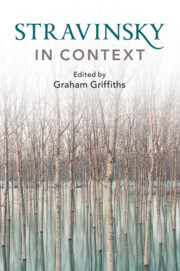Book contents
- Stravinsky in Context
- Composers in Context
- Stravinsky in Context
- Copyright page
- Contents
- Illustrations
- Contributors
- Preface
- Abbreviations
- Frontispiece
- Epigraph
- Part I Russia and Identity
- Part II Stravinsky and Europe
- Part III Partnerships and Authorship
- Chapter 12 Stravinsky’s Sphere of Influence: Paris and Beyond
- Chapter 13 Stravinsky and His Literary Collaborators
- Chapter 14 Assuming Co-authorship: Stravinsky and His ‘Ghostwriters’
- Chapter 15 Nadia Boulanger and Stravinsky: The Transition to America
- Chapter 16 Conversations with Craft
- Part IV Performance and Performers
- Part V Aesthetics and Politics
- Part VI Reception and Legacy
- Recommendations for Further Reading and Research
- Index
- Endmatter
Chapter 16 - Conversations with Craft
from Part III - Partnerships and Authorship
Published online by Cambridge University Press: 03 December 2020
- Stravinsky in Context
- Composers in Context
- Stravinsky in Context
- Copyright page
- Contents
- Illustrations
- Contributors
- Preface
- Abbreviations
- Frontispiece
- Epigraph
- Part I Russia and Identity
- Part II Stravinsky and Europe
- Part III Partnerships and Authorship
- Chapter 12 Stravinsky’s Sphere of Influence: Paris and Beyond
- Chapter 13 Stravinsky and His Literary Collaborators
- Chapter 14 Assuming Co-authorship: Stravinsky and His ‘Ghostwriters’
- Chapter 15 Nadia Boulanger and Stravinsky: The Transition to America
- Chapter 16 Conversations with Craft
- Part IV Performance and Performers
- Part V Aesthetics and Politics
- Part VI Reception and Legacy
- Recommendations for Further Reading and Research
- Index
- Endmatter
Summary
Robert Craft (1923–2015) was never merely an observer of Stravinsky’s life in America. Shortly after he joined the Stravinsky household towards the end of the 1940s, he ‘progressed from assistant to adviser, defender, collaborator and – his critics would argue – a resourceful “spin doctor”’;1 and, as Craft himself would claim through one of his monograph titles: a friend. The way in which Craft was ‘adopted’ by the Stravinskys and the influence he exerted on the performances of the composer’s music (and increasingly on his professional and social interactions) caused a degree of suspicion, even jealousy among Stravinsky’s children, friends and colleagues. However, Charles M. Joseph’s take on the Craft/Stravinsky relationship has been censured for telling the story in an almost teleological manner, not allowing either of them sufficient ‘measure of choice [or] of freedom’.2 Such interpretations also have a tendency to neglect the perspectives and influences of other key figures close to Stravinsky such as Ingolf Dahl, Lawrence Morton, Claudio Spies, Sol Babitz, Alex Haïeff, and Aldous Huxley. These were important too in arranging and reviewing performances of Stravinsky’s music, contributing to the creation and management of the composer’s image during and after his lifetime.
Keywords
- Type
- Chapter
- Information
- Stravinsky in Context , pp. 143 - 150Publisher: Cambridge University PressPrint publication year: 2020



